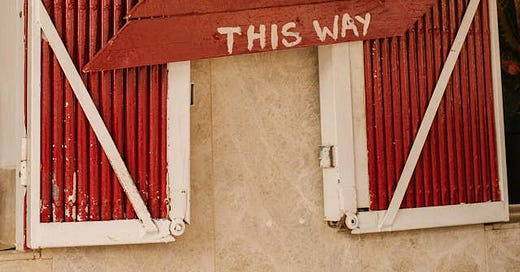Boundaries and Spirituality: When “Turning the Other Cheek” Isn’t Enough
Navigating Microaggressions and Toxic Positivity on the Spiritual Path
Trauma, Boundaries, and Spiritual Practice
Hey Beautiful, let’s dive into a no-holds-barred talk about spirituality and boundaries—especially the kind that frees some people and leaves others a bit uncomfortable. Ready?
I’m writing from Rishikesh, India, where I’m completing my 300-hour Yoga Teacher Training. This certification will allow me to teach advanced students, but it’s also pushing me to confront deeper questions about spirituality and self-worth.
In our daily yoga philosophy class, my instructor touched on a concept that struck a nerve: the idea that treating everyone kindly, even those who’ve wronged you, will “clear your karma.” While that sounds noble, I couldn’t help but feel uneasy. For people like “David” (a pseudonym), this philosophy seems like a free pass to be dismissive without ever facing accountability.
Have you ever been told to “turn the other cheek,” only to feel it erodes your sense of self? Let me break down why I think this approach has limits.
Microaggressions in the Yoga Class
Most of the time, I’m genuinely joyful. If you walked by my room at night, you’d probably hear me laughing at something that entertains me. During the day, I smile because I choose to see beauty around me. But am I perfectly happy all the time? Of course not. I, too, experience sadness, confusion, and anger—and I embrace these moments as essential parts of being human. Yet, despite my efforts to radiate positivity, it seems to irritate David.
Whenever I speak, he sighs audibly. When I laugh, he rolls his eyes or grunts. His reactions seem designed to make me feel uncomfortable—as if my happiness challenges him.
Let’s get on the same page here. “Microaggression” is a term for subtle, often unintentional, behavior that communicates hostility or negativity toward others based on differences (thank you, Wikipedia). In many group settings, microaggressions are sadly common.
But why is this a problem? Let’s talk about the bigger picture.
The Issue with “Turn the Other Cheek”
In various spiritual and religious traditions, we’re taught to “turn the other cheek” when others mistreat us. It’s implied that enduring others’ bad behavior brings us closer to Heaven, Nirvana, or some mystical reward. But honestly, doesn’t this sound like a tactic used by oppressors? If you’re sensitive to this topic, consider this your warning—I’m about to dive deeper.
In ancient Rome, Julius Caesar famously staged brutal Gladiator fights to entertain and distract the masses, especially the poor, from their own hardships and unmet needs. This strategy discouraged people from questioning their circumstances, and in many ways, we’re still encouraged to “rise above” mistreatment in a similar way.
When we label others’ toxic behaviors as a “spiritual challenge,” we risk losing a part of ourselves. Focusing solely on an afterlife or distractions from our present experience can pull us further from true spirituality. Spirituality, to me, is about being deeply aware, present, and in touch with our emotions, reactions, and the impact of others on our mind, body, and soul.
Reclaiming Spirituality through Boundaries
Through my own experiences, I’ve learned that letting go of forced politeness and being honest with myself leads to genuine growth. Not every experience is easy, and some encounters reveal old narratives that no longer serve me. These realizations are an invitation for deeper healing.
Over time, acknowledging my own experiences—and sharing them—has validated not only myself but others who may feel similarly. This self-awareness has opened doors to growth, and the universe often rewards me in ways I’ve long dreamt of or hoped for.
So, while I respect the idea of “turning the other cheek” in the name of enlightenment, I believe that ignoring toxic behavior creates a space of “toxic spirituality.” When we passively endure mistreatment, not only do we stray further from our true selves, but we also prevent those around us from learning and growing.
I’ll always stand for uncomfortable but necessary conversations. There’s a space for practicing awareness and unconditional love while still holding boundaries that protect our energy.
Appreciation and Growth
I’m genuinely grateful for every person who has been part of this journey. Without their presence, I wouldn’t have had the chance to reflect, to meet amazing new people, or to share my story with those who needed to hear it. I’m thankful for the effort my yoga school has put into creating a supportive environment, and I appreciate every lesson learned—even the uncomfortable ones.
Today, I’m more aware, more loving, and more connected to my inner self because of these experiences. And I’m grateful for every moment that made me uncomfortable enough to seek change.
What About You?
Where do you draw the line between compassion and self-respect in your spiritual journey? Have you encountered similar challenges? I’d love to hear your thoughts—let’s start a conversation.




